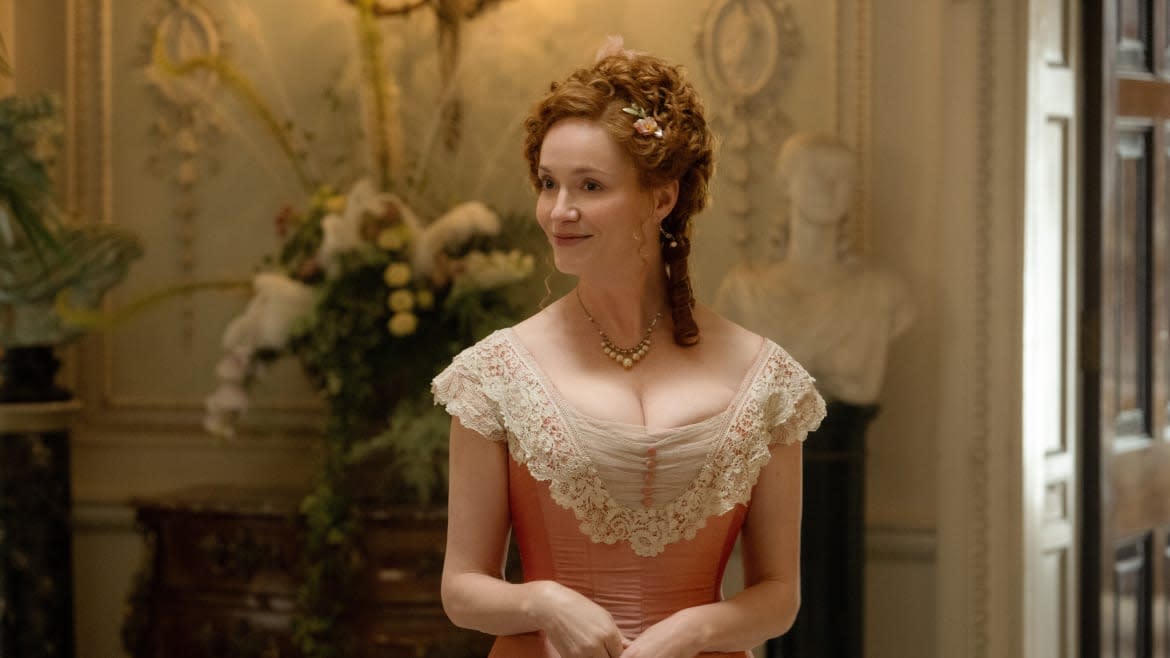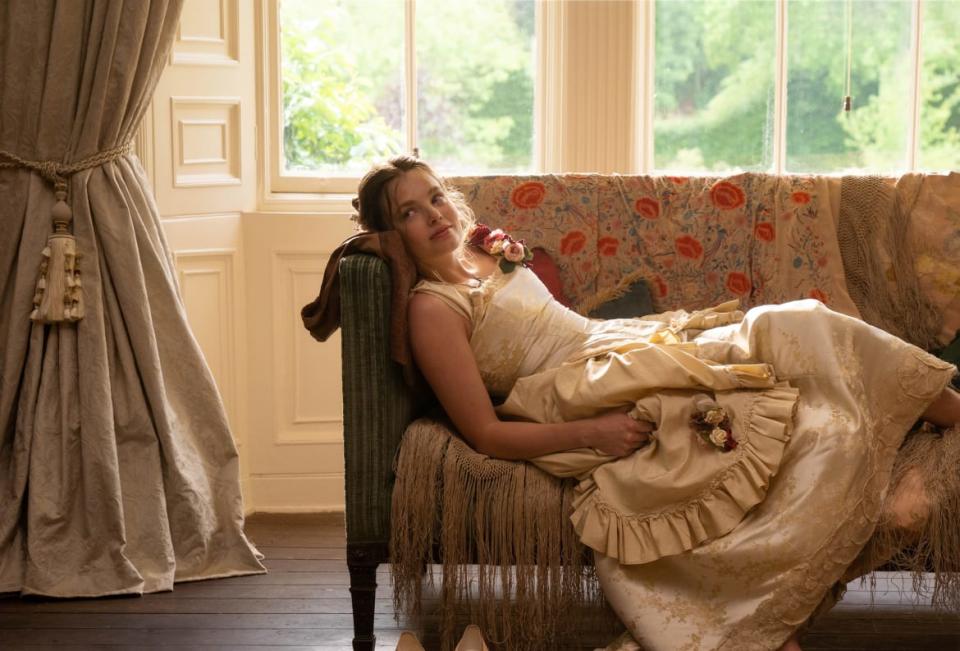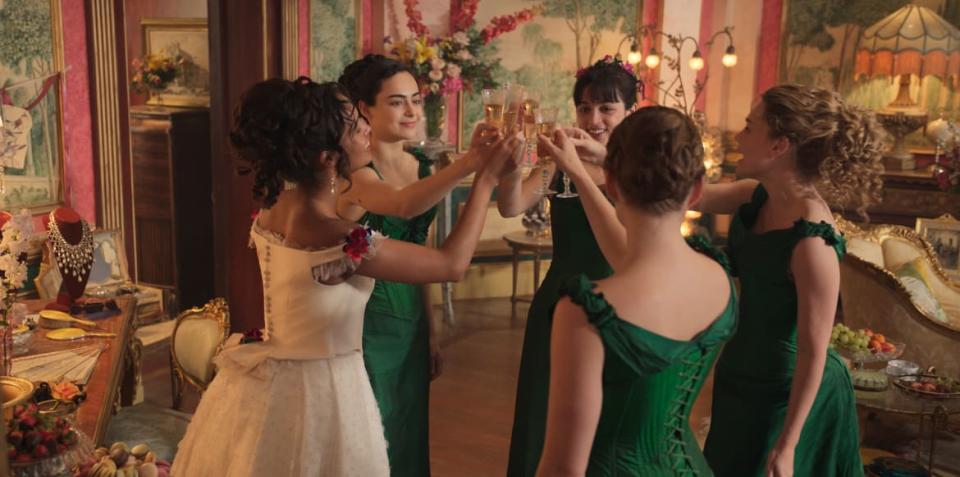‘The Buccaneers’ Badly Wants to Be ‘Bridgerton’—But Not Badly Enough

Apple TV+ has, in the past, hit big with modernized period television. Dickinson was an underrated masterpiece, starring Hailee Steinfeld in a sexy, fictionalized adaptation of poet Emily Dickinson with a queer spin on her love life. Alongside Bridgerton, Netflix’s steamy Regency-era drama, Dickinson proved that period pieces could be even more exciting with anachronistic twists, like the use of Ariana Grande songs and raunchy cake sex scenes.
With The Buccaneers, an adaptation of Edith Wharton’s final novel, Apple is attempting to double down on this “period but make it contemporary” genre. But Dickinson and Brigerton were able to explore 19th century American and English women with 2020s twists. The Buccaneers, meanwhile, suffers from culture clash—not just in the characters’ debates about English and American ideals, but also from the show’s incongruous attempts at mashing up the late-1800s and today.

The series follows a handful of young American women who have become socialites in London. Nan St. George (Kristine Froseth), who narrates, has never felt like the main character in her own life, The Buccaneers begins, because her rambunctious friends have always stolen the attention from her. Nan doesn’t even feel important in her own home, where her mother (Christina Hendricks) is fixated on Nan’s younger sister Jinny (Imogen Waterhouse), who is far more interested in selling herself away to the right husband in the London Season. But by saying she’s never been the leading lady, Nan immediately makes herself the show’s center of attention.
Conchita Closson (Alisha Boe), a bestie of Nan with the sweetest love story in all of England, often captures what could’ve been Nan’s spotlight. Although some cold feet nearly get in the way of their wedding, Conchita spends the majority of the series’ eight episodes working through the tribulations of married life with her dashing husband Lord Richard Marable (Josh Dylan, who I’m grateful to see again after his fantastic turn as Young Bill in Mamma Mia! Here We Go Again). Its depiction of marriage is The Buccaneers’ most fascinating aspect, giving us Conchita’s complicated view of the sometimes-sunny, sometimes-dreary societal construct, as well as the stories of different girls looking to marry or fight against their fate.
The St. George sisters, in particular, often quarrel over marriage. Jinny’s hunt for true love butts up against Nan’s persistent quest for independence—a trite juxtaposition in period pieces. Nan’s apprehension about the English marriage system is short-lived, however, as she falls for two different men—the coy Guy Thwarte (Matthew Broome) and sensible Theo (Guy Remmers), the Duke of Tintangel—who offer white-hot attraction and stability, respectively. Should Nan cling to the man who ignites her American independence, or opt to settle into London society with a man who would give her great status?
The Astonishing ‘Fellow Travelers’ Is Pornographic Prestige
Along with complicating the audience’s feelings about marriage—some conversations about love are fascinating; others are stale, rehearsed feminist takes about why a man shouldn’t buy a woman—The Buccaneers spends its time building its dynamic women characters. Froseth’s Nan is fresh and exciting; Waterhouse’s Jinny is conniving and clever. As Conchita, Boe is the most entrancing; she’s a woman confused by her new married life but also excited to start a new chapter, even as her friends continue on in singledom. The women are at their best when all paired together, dancing to Taylor Swift and Phoebe Bridgers (one of the show’s frequent anachronistic touches), frolicking in fields of flowers, or gossipping about boys and new unions.

Where The Buccaneers struggles, however, is this mix of period and contemporary. Despite the frenetic techno score and modern-day soundtrack, the actual storylines lack any similar modernizations. The prim-and-proper narrative of The Buccaneers is more akin to Joe Wright’s PG-rated Pride and Prejudice adaptation than the bodice-busting Bridgerton—without any of that film’s electric chemistry.
Unable to choose between its modern sensibilities or period-piece faithfulness, The Buccaneers opts for a blend that doesn’t really work. But a show like this one should either be all in on spicing things up—with more contemporary dialogue to match the funky music, say—or stay completely realistic to the time period, giving audiences the option to fully immerse themselves in history. By making no attempt to excel at either, the adaptation feels neither unique nor classic—just mediocre.
Get the Daily Beast's biggest scoops and scandals delivered right to your inbox. Sign up now.
Stay informed and gain unlimited access to the Daily Beast's unmatched reporting. Subscribe now.

 Yahoo News
Yahoo News 
